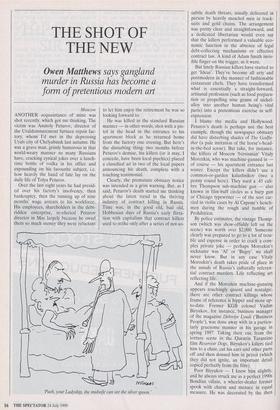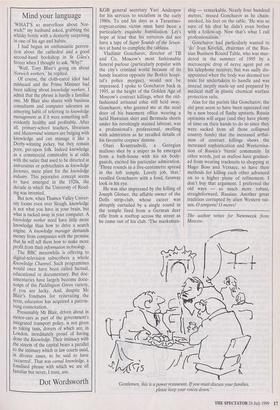THE SHOT OF THE NEW
Owen Matthews says gangland
murder in Russia has become a form of pretentious modern art
Moscow ANOTHER acquaintance of mine was shot recently, which got me thinking. The victim was Anatoly Peturov, director of the Uraldomnaremont furnace repair fac- tory, whom I'd met in the depressing Urals city of Chelyabinsk last autumn. He was a grave man, grimly humorous in that world-weary manner so many Russians have, cracking cynical jokes over a lunch- time bottle of vodka in his office and expounding on his favourite subject, i.e. how heavily the hand of fate lay on the daily life of Tolya Peturov.
Over the last eight years he had presid- ed over his factory's insolvency, then bankruptcy, then the running up of nine months' wage arrears to his workforce. His employees, shareholders in the debt- ridden enterprise, re-elected Peturov director in May largely because he owed them so much money they were reluctant to let him enjoy the retirement he was so looking forward to.
He was killed in the standard Russian manner — in other words, shot with a pis- tol in the head in the entrance to his apartment block as he returned home from the factory one evening. But here's the disturbing thing: two months before Peturov's demise, his killers (or it may, I concede, have been local psychics) placed a classified ad in two of the local papers announcing his death, complete with a touching testimonial.
Clearly, the premature obituary notice was intended as a grim warning. But, as I said, Peturov's death started me thinking about the latest trend in the thriving industry of contract killing in Russia. Time was, in the good old, had old, Hobbesian days of Russia's early flirta- tion with capitalism that contract killers used to strike only after a series of not-so- Push, your Ladyship, the midwife can see the silver spoon.' subtle death threats, usually. delivered in person by heavily muscled men in track- suits and gold chains. The arrangement was pretty clear and straightforward, and a dedicated libertarian would even say that the killers performed a valuable eco- nomic function in the absence of legal debt-collecting mechanisms or effective contract law. A kind of Adam Smith invis- ible finger on the trigger, as it were.
But lately Russian killers have started to get 'Ideas'. They've become all arty and postmodern in the manner of fashionable restaurant chefs. They have transformed what is essentially a straight-forward, artisanal profession (such as food prepara- tion or propelling nine grams of nickel- alloy into another human being's vital parts) into a pretentious exercise in self- expression.
I blame the media and Hollywood. Peturov's death is perhaps not the best example, though the newspaper obituary did have disturbing shades of The Godfa- ther (a pale imitation of the horse's-head- in-the-bed scene). But take, for instance, the killers of Moscow `biznisman' Vitaly Morozkin, who was machine-gunned in of course — his apartment entrance last winter. Except the killers didn't use a common-or-garden kalashnikov (two a penny round here). They used a .45 cali- bre Thompson sub-machine gun — also known in film-huff circles as a burp gun or Chicago typewriter — of the sort car- ried in violin cases by Al Capone's hench- men during the rough and tumble of Prohibition.
By police estimates, the vintage Thomp- son (which was show-offishly left on the scene) was worth over $2,000. Someone clearly was prepared to go to a lot of trou- ble and expense in order to crack a com- plex private joke — perhaps Morozkin's nickname was 'Al' or `Bugsy', we shall never know. But in any case Vitaly Morozkin's death takes pride of place in the annals of Russia's culturally referen- tial contract murders. Life reflecting art reflecting life.
And if the Morozkin machine-gunning appears touchingly quaint and nostalgic, there are other contract killings whose frame of reference is hipper and more up- to-date. Former KGB colonel Vadim Biryukov, for instance, business manager of the magazine Deloviye Lyudi (`Business People'), was done away with in a particu- larly gruesome manner in his garage in spring 1997. Taking their cue from the torture scene in the Quentin Tarantino film Reservoir Dogs, Biryukov's killers tied him to a chair, cut his ears and other parts off and then doused him in petrol (which they did not ignite, an important detail copied perfectly from the film).
Poor Biryukov — I knew him slightly, and he always struck me as a perfect 1990s Bondian villain, a wheeler-dealer former spook with charm and menace in equal measure. He was decorated by the then
KGB general secretary Yuri Andropov for his services to socialism in the early 1980s. To end his days as a Tarantino- copycat-crime victim must have been a particularly exquisite humiliation. Let's hope at least that his torturers did not have a tape of Super Sounds of the Seven- ties at hand to complete the tableau.
Vladimir Goncharov, director of TB and Co, Moscow's most fashionable funeral parlour (particularly popular with the city's criminal world because of its handy location opposite the Botkin hospi- tal's police morgue), would not be impressed. I spoke to Goncharov back in 1995, at the height of the Golden Age of Moscow's contract killings, when the old- fashioned artisanal ethic still held sway. Goncharov, who greeted me at the steel door of his basement office wearing a lurid Hawaiian shirt and Bermuda shorts under his revoltingly stained labcoat, was a professional's professional, swelling with admiration as he recalled details of his favourite corpses' demise.
Otari Kvantrashvili, a Georgian mafioso shot by a sniper as he emerged from a bath-house with his six body- guards, excited his particular admiration. 'Three rounds in a five-centimetre spread in the left temple. Lovely job, that,' recalled Goncharov with a fond, faraway look in his eye.
He was also impressed by the killing of Joseph Glotser, the affable owner of the Dolls strip-club, whose career was abruptly curtailed by a single round in the temple fired from a German deer rifle from a rooftop across the street as he came out of his club. The marksman-
ship — remarkable. Nearly four hundred metres,' mused Goncharov as he chain- smoked, his feet on the table. 'He was so sure of his shot he didn't even bother with a follow-up. Now that's what I call professionalism.'
Goncharov had particularly wanted to `do' Ivan Kivelidi, chairman of the Rus- sian Business Round Table, who was mur- dered in the summer of 1995 by a microscopic drop of nerve agent put on his telephone receiver, but was sadly dis- appointed when the body was deemed too toxic for undertakers to handle and was instead ineptly made-up and prepared by medical staff in plastic chemical warfare protection suits.
Alas for the purists like Goncharov, the old pros seem to have been squeezed out by a new breed of flashy upstarts. Russia optimists will argue (and they have plenty of time on their hands to do so since they were sacked from all those collapsed country funds) that the increased artful- ness of contract killings shows the increased sophistication and Westernisa- tion of Russia's tiznis' community. In other words, just as mafiosi have graduat- ed from wearing tracksuits to shopping at Hugo Boss and Versace, so have their methods for killing each other advanced on to a higher plane of refinement. I don't buy that argument. I preferred the old ways — so much more robust, straightforward, Russian. Another great tradition corrupted by alien Western val- ues. 0 temporal 0 mores!
The author writes for Newsweek from Moscow.
'Gentlemen, this is a power restaurant. If you must discuss your families, please keep your voices down.'



























































 Previous page
Previous page